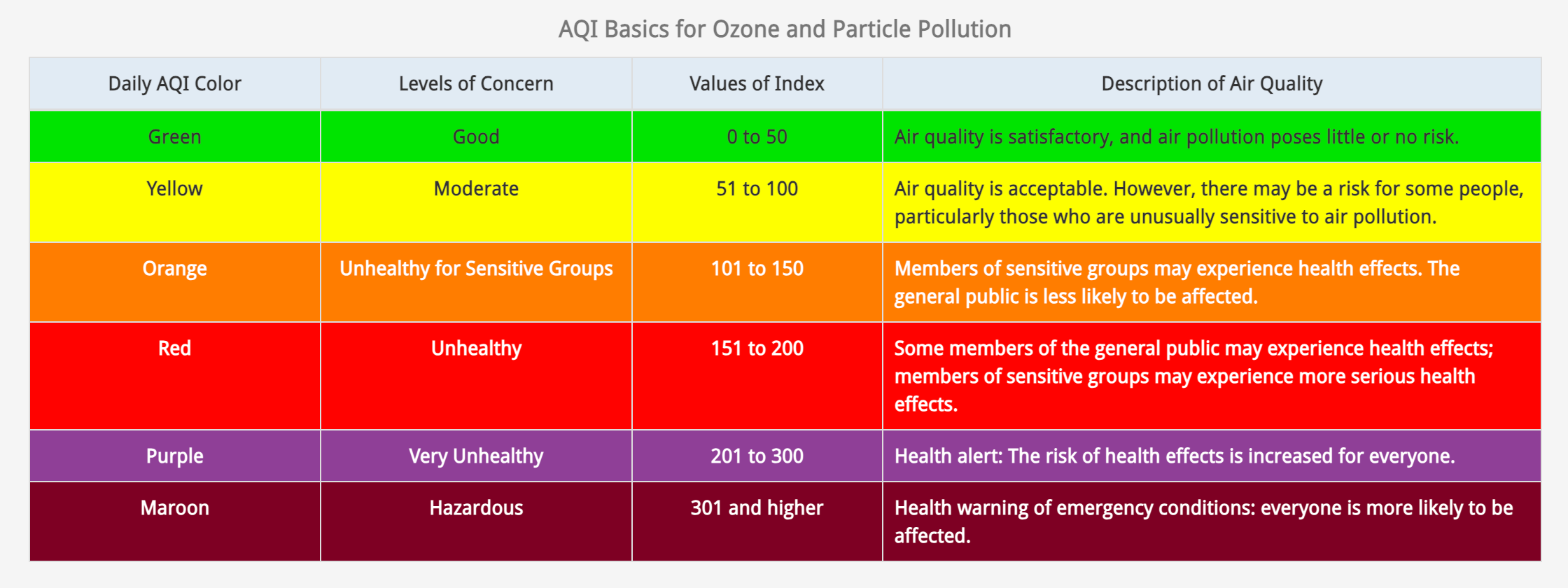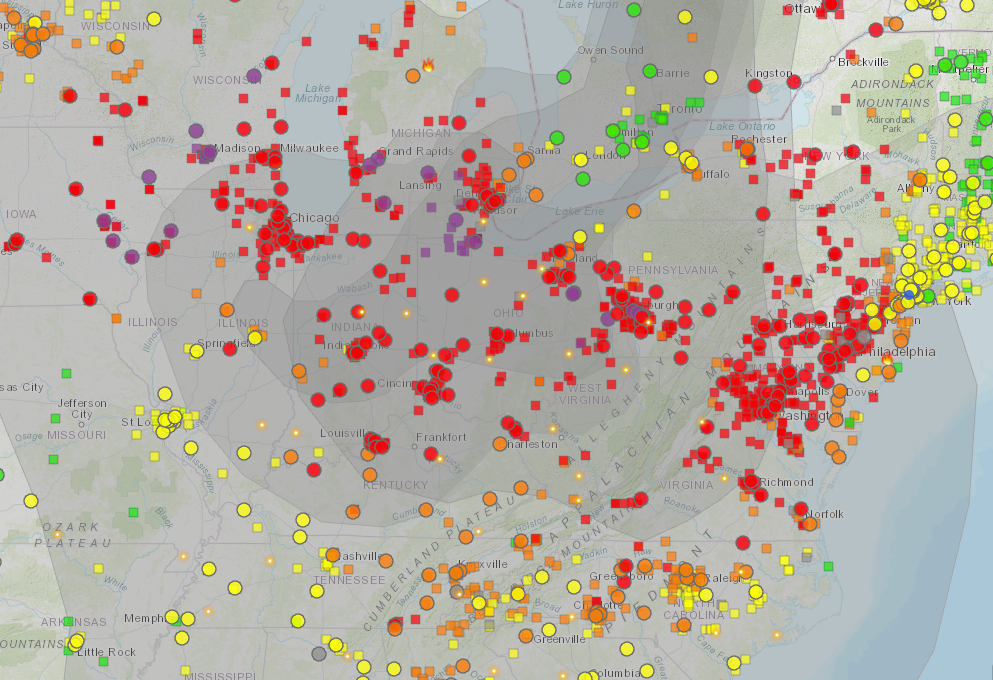Wildfire smoke leaves 100 million under air quality alerts as nine Texas prison inmates die in heatwave
People living in the Midwest and Northeast were warned of a worsening air quality index throughout the week due to smoke from the Canadian wildfires
Your support helps us to tell the story
From reproductive rights to climate change to Big Tech, The Independent is on the ground when the story is developing. Whether it's investigating the financials of Elon Musk's pro-Trump PAC or producing our latest documentary, 'The A Word', which shines a light on the American women fighting for reproductive rights, we know how important it is to parse out the facts from the messaging.
At such a critical moment in US history, we need reporters on the ground. Your donation allows us to keep sending journalists to speak to both sides of the story.
The Independent is trusted by Americans across the entire political spectrum. And unlike many other quality news outlets, we choose not to lock Americans out of our reporting and analysis with paywalls. We believe quality journalism should be available to everyone, paid for by those who can afford it.
Your support makes all the difference.The US is currently battling extreme weather events, with millions of people under air quality alerts across the Midwest and Northeast while southern states including Texas are battling dangerous heatwaves.
Smoke from more than 500 wildfires burning in Canada is blanketing large areas across the country and causing “unhealthy” to “very unhealthy” air quality conditions for residents.
As of early Friday morning, more than 100 million people were under air quality alerts.
Toronto had the worst air quality in the world of all major cities, followed by Washington DC, according to IQAir.
Meanwhile, almost 60 million people were under heat alerts on Wednesday as “dangerous” temperatures continued to grip southern states and parts of Mexico.
The relentless, triple-digit heatwave – exacerbated by the climate crisis – entered its third week. The severe conditions have caused 13 deaths in Texas and led to a spike in emergency room attendance across the state.
At least nine inmates – including two men in their 30s – in Texas prisons have died of heart attacks or unknown causes since the start of the sweltering heatwave.
11 deaths attributed to Texas heat
At least 11 people have died due to heat-related illness in Texas as the southern United States experiences an unusually high heat index.
In Webb County, the individuals who died ranged in age from 60 to 80 years old, according to the Webb County Medical Examiner’s Office.
“I come to you with a heavy heart this morning,” Dr Corinne Stern said.
“This is heat like we’ve not seen here before. Please, please, please. Deaths due to heat stroke are ruled as accidents, and accidents, by definition, are preventable deaths. All these deaths could have been prevented,” Dr Stern said. “Please check on your neighbors.”
How wildfire smoke affects your health
Air quality has plummeted again this week across large parts of the United States and Canada due to more than 450 wildfires burning north of the border.
Air quality ranged from “unhealthy” to “very unhealthy” in the Midwest with Chicago ranking number one in worst air quality in the world on Tuesday.
By Wednesday, winds were pushing the smoke towards the east coast with New York City expected to be most severely impacted on Thursday.
Louise Boyle reports:

How wildfire smoke affects your health
Canada warns this could be country’s worst wildfire season on record and smoke might be a problem ‘all summer’
This is what the air quality index (AQI) is
The air quality index (AQI) was established by the Environmental Protection Agency as a way of measuring the density of pollutants in the air to determine how healthy or unhealthy the air quality is for people.
The AQI scale runs from 0 to 500 and uses colors to correspond to the range the air quality is in.
Air quality alerts are typically administered if the number reaches over 100 – which is considered unhealthy for sensitive groups.

Expect a hot, smoky summer in much of America. Here's why you'd better get used to it
The only break much of America can hope for anytime soon from eye-watering dangerous smok e from fire-struck Canada is brief bouts of shirt-soaking sweltering heat and humidity from a southern heat wave that has already proven deadly, forecasters say.
And then the smoke will likely come back to the Midwest and East.
That’s because neither the 235 out-of-control Canadian wildfires nor the stuck weather pattern that’s responsible for this mess of meteorological maladies are showing signs of relenting for the next week or longer, according to meteorologists at the National Oceanic and Atmospheric Administration’s Weather Prediction Center.
First, the stuck weather pattern made abnormally hot and dry conditions for Canada to burn at off-the-chart record levels. Then it created a setup where the only relief comes when low-pressure systems roll through, which means areas on one side get smoky air from the north and the other gets sweltering air from the south.
Smoke or heat. “Pick your poison,” said prediction centre forecast operations chief Greg Carbin. “The conditions are not going to be very favourable.”
“As long as those fires keep burning up there, that’s going to be a problem for us,” Carbin said. “As long as there’s something to burn, there will be smoke we have to deal with.”
AP
Take St. Louis. The city had two days of unhealthy air Tuesday and Wednesday, but for Thursday “they’ll get an improvement of air quality with the very hot and humid heat,” said weather prediction centrr meteorologist Bryan Jackson. The forecast is for temperatures that feel like 109 degrees (42.8 degrees Celsius) — with 101 degree (38.3 degrees Celsius) heat and stifling humidity.
On Wednesday, the low pressure system was parked over New England and because winds go counter-clockwise, areas to the west – such as Chicago and the Midwest – get smoky winds from the north, while areas east of the low pressure get southerly hot winds, Jackson said.
As that low pressure system moves on and another one travels over the central Great Plains and Lake Superior, the Midwest gets temporary relief, Jackson said. But when low pressure moves on, the smoke comes back.
“We have this this carousel of air cruising around the Midwest, and every once in a while is bringing the smoke directly onto whatever city you live in,” said University of Chicago atmospheric scientist Liz Moyer. “And while the fires are ongoing, you can expect to see these periodic bad air days and the only relief is either when the fires go out or when the weather pattern dies.”
The stuck weather pattern is “awfully unusual,” said NOAA’s Carbin who had to look back in records to 1980 to see anything even remotely similar. “What gets me is the persistence of this.”
AP
Why is the weather pattern stuck? This seems to be happening more often — and some scientists suggest that human-caused climate change causes more situations where weather patterns stall. Moyer and Carbin said it’s too soon to tell if that’s the case.
But Carbin and Canadian fire scientist Mike Flannigan said there’s a clear climate signal in the Canadian fires. And they said those fires aren’t likely to die down anytime soon, with nothing in the forecast that looks likely to change.
Nearly every province in Canada has fires burning. A record 30,000 square miles (80,000 square kilometers) have burned, an area nearly as large as South Carolina, according to the Canadian government.
And fire season usually doesn’t really get going until July in Canada.
“It’s been a crazy crazy year. It’s unusual to have the whole country on fire,” said Flannigan, a professor at Thompson Rivers University in British Columbia. “Usually it’s regional... not the whole shebang at once.”
Hotter than normal and drier air made for ideal fire weather, Flannigan said. Warmer weather from climate change means the atmosphere sucks more moisture out of plants, making them more likely to catch fire, burn faster and hotter.
“Fires are all about extremes,” he said.
And where there’s fire, there’s smoke.
AP
Both high heat and smoky conditions are stressors on the body and can present potential challenges to human health, said Ed Avol, a professor emeritus at the Keck School of Medicine at University of Southern California.
But Avol added that while the haze of wildfire smoke provides a visual cue to stay inside, there can be hidden dangers of breathing in harmful pollutants such as ozone even when the sky looks clear. He also noted there are air chemistry changes that can happen downwind of wildfire smoke, which may have additional and less well-understood impacts on the body.
It’s still only June. The seasonal forecast for the rest of the summer in Canada “is for hot and mostly dry” and that’s not good for dousing fires, Flannigan said. “It’s a crazy year and I’m not sure where it’s going to end.”
AP
Texas seldom acknowledges heat as a cause of death in stifling unairconditioned prisons
Per reporting by Jolie McCullough in The Texas Tribune:
Since a heat wave gripped Texas, at least nine inmates, including two men in their 30s, have died of heart attacks or unknown causes in prisons lacking air conditioning. It’s been 11 years since the state last classified a death as heat-related.
Here is McCullough’s description of prison conditions in the state:
More than two-thirds of Texas' 100 prisons don't have air conditioning in most living areas. Every summer, as temperatures routinely soar well into triple digits, thousands of officers and tens of thousands of prisoners are cramped inside concrete and steel buildings without ventilation, save windows broken out of desperation and fans that blow the hot air. The heat has killed prisoners, likely contributed to severe staff shortages, and cost taxpayers millions of dollars in wrongful death and civil rights lawsuits over the last decade.
This year, state lawmakers chose again not to put any money directly toward installing air conditioning in the dangerously hot prisons, despite a $32.7 billion budget surplus.
Read the full report here.
Much of Midwest and I-95 corridor now registering ‘Unhealthy’ air quality
A broad swathe of the US from Norfolk, Virginia, up to Jersey City to the west of New York City, and then across Pennsylvania, Ohio, Indiana, Illinois and reaching as far as Des Moines to the west is now registering “unhealthy” or “very unhealthy” air quality as of midday.
The air quality is currently especially bad in the vicinity of Pittsburgh, Toledo, Madison, and Cedar Rapids, reaching into the “very unhealthy” zone.
Washington, Chicago, Cleveland, Cincinnati, Philadephia and Detroit remain firmly in the “unhealthy” zone.


Detroit leading world in worst air quality
As of 12.15pm ET, Detroit had the worst urban air quality in the world with a US AQI of 184, narrowly ahead of Washington, DC (182), then Dubai (156), Lahore and Sao Paulo (153), and then Chicago at 151.
Rounding out the top ten are Shenyang (146), Jakarta (129), Montreal (114), and Minneapolis (109).
The city with the cleanest air in the world is Oslo with a score of 8.





Join our commenting forum
Join thought-provoking conversations, follow other Independent readers and see their replies
Comments